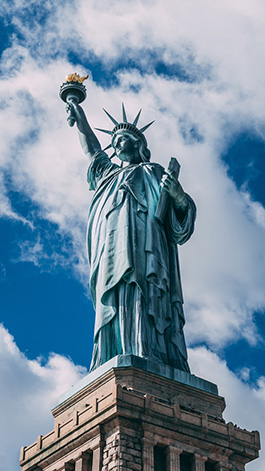Word of the Week: Liberty
- ANTHONY ESOLEN
Welcome, everyone, to Word of the Week! And as is fitting for this day, and for our inaugural entry, today's word is LIBERTY.
 What does it mean? Most Americans will reply that you have liberty if you’re permitted to do what you feel like, so long as you don’t tread on your neighbor’s corns. Every individual is a kind of atom of desire. What you want, you want, and you should be let alone to get it, provided that you don’t rob or kill or rape, or burn someone’s house down, and other things that even the most selfish people will blanch at.
What does it mean? Most Americans will reply that you have liberty if you’re permitted to do what you feel like, so long as you don’t tread on your neighbor’s corns. Every individual is a kind of atom of desire. What you want, you want, and you should be let alone to get it, provided that you don’t rob or kill or rape, or burn someone’s house down, and other things that even the most selfish people will blanch at.
Suppose I ask, “Which of the ancient pagan philosophers believed that if you are talking about liberty apart from virtue, you’re not talking about liberty at all, but license, and license enslaves?” It’s a trick question. They all did. Even the Epicureans did, and they had least cause to, as they believed that life was all about securing pleasure and avoiding pain. So did the authors of Scripture. Think of the sad final sentence of the book of Judges: “In those days there was no king in Israel, and every man did what was right in his own eyes” (21:25). In other words, there was no real society, but confusion and injustice. “What is liberty without wisdom,” said Edmund Burke, “and without virtue? It is the greatest of all possible evils; for it is folly, vice, and madness, without tuition or restraint.” It is a rope to hang yourself with.
But if we look at the Latin libertas, the origin of our word, we don’t find any notion of doing whatever you like. Libertas is what you inherit from your fathers, the condition of a liber, a free-born citizen: hence the word liber came to refer to a free-born child, one who would grow up to share in the laws and the goods of a free self-governing land. If you scorn your people’s past, you don’t have the grateful mind of a liber. If your way of life sets you, in principle, apart from considerations of the common good, you don’t have the responsible mind of a liber. If your government does not acknowledge that you and your fellows in your homes, neighborhoods, communities, schools, and parishes exercise a real and sacred authority which bureaucrats must yield to, you don’t have liberty at all. You are not citizens. You are clients, or slaves.
The Lady in the harbor raises her torch not for license, but for liberty and the virtues that make it possible. Let us remember it, and honor those who have bequeathed to us whatever liberty we still enjoy!
 This is J. Fraser Field, Founder of CERC. I hope you appreciated this piece. We curate these articles especially for believers like you.
This is J. Fraser Field, Founder of CERC. I hope you appreciated this piece. We curate these articles especially for believers like you.
Please show your appreciation by making a $3 donation. CERC is entirely reader supported.

Acknowledgement
 Anthony Esolen. "Word of the Week: Liberty." Word & Song (July 4, 2022).
Anthony Esolen. "Word of the Week: Liberty." Word & Song (July 4, 2022).
Reprinted with permission from the author. Image credit: Photo by Atahan Guc on Unsplash.
The Author

Anthony Esolen is writer-in-residence at Magdalen College of the Liberal Arts and serves on the Catholic Resource Education Center's advisory board. His newest book is "No Apologies: Why Civilization Depends on the Strength of Men." You can read his new Substack magazine at Word and Song, which in addition to free content will have podcasts and poetry readings for subscribers.
Copyright © 2022 Word & Song

